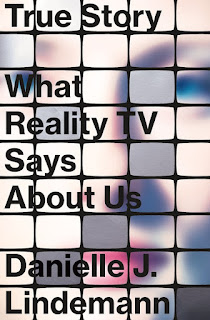 Commuter Spouses: New Families in a Changing World and Dominatrix: Gender, Eroticism and Control in the Dungeon. Her research has been featured in media outlets such as The New York Times, The Wall Street Journal, The Economist, The Atlantic, The Washington Post, Rolling Stone, Billboard, and The Chronicle of Higher Education. She has spoken about her work on National Public Radio and has written op-eds for CNN, Newsweek, Salon, Fortune, and Quartz.
Commuter Spouses: New Families in a Changing World and Dominatrix: Gender, Eroticism and Control in the Dungeon. Her research has been featured in media outlets such as The New York Times, The Wall Street Journal, The Economist, The Atlantic, The Washington Post, Rolling Stone, Billboard, and The Chronicle of Higher Education. She has spoken about her work on National Public Radio and has written op-eds for CNN, Newsweek, Salon, Fortune, and Quartz.
Lindemann applied the “Page 99 Test” to her latest book, True Story: What Reality TV Says About Us, and reported the following:
Page 99 of True Story: What Reality TV Says about Us is in the middle of chapter 4, which explores how reality TV teaches us about our cultural expectations for families and the roles that we play within them. Specifically, drawing on Sharon Hays’s research on “intensive mothering,” this page discusses how reality programming exposes our narrow guidelines for what makes a “good mom” and how these guidelines ultimately reflect a middle class, white ideal. “Ultimately,” I argue, “legitimate mothering gets tied to class privilege because it’s generally the privileged who have the bandwidth to be intensive.”Visit Danielle J. Lindemann's website.
The test works for this book…somewhat. The content on page 99 of True Story is fairly specific, so it’s not the single best page for illuminating the book’s overall argument. That said, readers turning to the page will get some sense of the larger work! Page 99, like the book overall, deploys sociological research (e.g. Lareau’s work on parenting and social class, Hays’s research on intensive mothering) to explain how reality television can teach us about ourselves as a culture. And, the page reflects two key arguments in the larger work. The first is that, for all of its zaniness, reality TV tends to show us how conservative we are—that is, how we view the world in narrow and unyielding ways that reflect the persistent tug of history. On page 99, specifically, we see how rigidly we define and understand “legitimate” motherhood. Secondly, True Story argues that reality TV exposes the categories and meanings that shape our lives, and that we falsely take for granted to be biological and fixed. On page 99, I’m discussing how our ideas about what constitutes “natural,” “normal” mothering are inexorably linked to the society of which we are a part. Reality TV may not always be “really real,” but neither is “reality” itself. In many ways, it’s a social construction.
One central argument of the work, not reflected on page 99, is that reality TV reveals, in amplified form, both the ugliest and prettiest parts of ourselves, as a culture. As I say in the introduction, “These programs show us the ugly places we’ve been and the ugly places where we still are; they illuminate the inequalities that cut our culture deeply, leaving ruts we may never repair. They showcase elements of our culture in drag form, bold and garish. At the same time, the genre holds the potential to explore new possibilities, diversities, and creativities.” I add that when we look into the “funhouse mirror” of reality TV, “the reflection may not be pretty, but we gain a keener understanding of ourselves.”
--Marshal Zeringue



